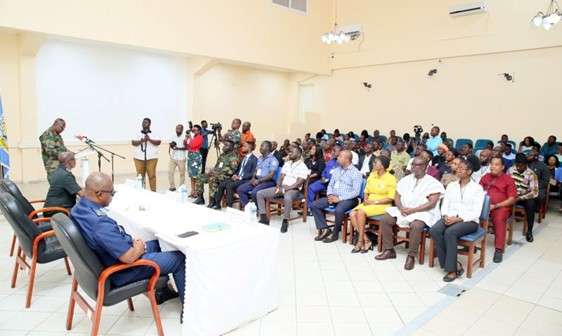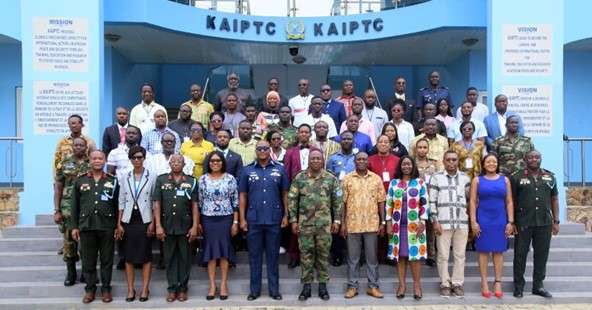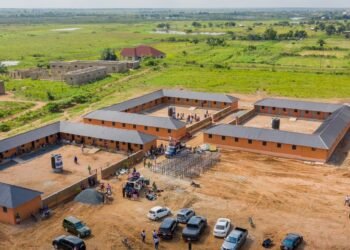The Kofi Annan International Peacekeeping Training Centre (KAIPTC) has announced plans to introduce undergraduate degrees in Peace and Security.
This initiative aligns with KAIPTC’s mission to provide globally-recognized capacity for international actors on African peace and security through training, education, and research to foster peace and stability in Africa. The center aims to become the leading and preferred international Centre for training, education, and research in African peace and security.
“Across the United Nations, African Union and ECOWAS, peace and security issues dominate discussions, hence the need to encourage young people to take up careers in the field. It is for this reason that we decided to introduce diploma and degree programs in addition to the existing Master’s and Doctor of Philosophy (PhD) programs in peace and security as well as gender studies.”
Major General Richard Addo Gyane, Commandant of the Centre
The Commandant of the Centre, Major General Richard Addo Gyane announced this at the launch of three new short courses being run commercially by the Centre. The new courses, Conflict Analysis and Mediation, Artificial Intelligence (AI) in Peacebuilding, and Leadership and Management in Security Organizations were aimed to provide the participants with the skillsets to be better prepared to address the multifaceted challenges of modern peacekeeping and security management.
General Gyane emphasized the importance of the new undergraduate program expansion in peacebuilding. He explained that this initiative aims to equip young graduates with the skills they need for careers in this field, as peace and security issues have become a top global priority.
According to General Gyane, currently, KAIPTC focuses on training military, police, and civilian personnel for peace and security across Africa. The peace and security space, he said covers issues of gender, climate change, and political leadership which are all critical that young people could build careers around.
Also, General Gyane highlighted that KAIPTC is thrilled to open its doors and share its mission of providing diverse opportunities for knowledge and growth in peace and security to Ghanaians.
He encouraged participants to seize the opportunity to engage with experts and practitioners in the field, benefiting from a platform that not only offers valuable learning experiences but also facilitates connections and potential partnerships.
General Gyane further emphasized KAIPTC’s commitment to addressing knowledge gaps in Ghanaian communities, stressing the Centre’s quest to continue to roll out online and hybrid courses alongside the undergraduate programs that are to be launched soon.
The introduction of undergraduate degrees in Peace and Security by KAIPTC represents a significant step towards enhancing global capacity in peacekeeping and security. This development is in line with the center’s vision and mission, aiming to contribute to peace and stability in Africa and beyond.
Enhancing the Expertise of Participants

KAIPTC provides mission-oriented training at the operational level for selected participants before their deployment in areas of operations. This focuses on the practical aspects of peace support operations (PSOs), ensuring that participants are well-prepared for the challenges they will face in the field.
The programs aim to improve participants’ ability to operate in multinational environments of contemporary peace support operations. This is crucial for the effective cooperation between contingents from different countries, which is essential for the success of PSOs.
General Gyane indicated that KAIPTC enhances participants’ understanding of the nature and complexities of contemporary inter- and intra-state conflicts. This knowledge is vital for making informed decisions and strategies during PSOs.
The center conducts research into various facets of peace support operations and offers conferences, lectures, workshops, seminars, and computer-simulated training exercises to share best practices in the field of peacekeeping. This ensures that participants are updated with the latest developments and methodologies in PSOs.
“When you look at our continent, one of the major challenges we face is leadership and governance. At KAIPTC, we believe introducing undergraduate programs will help young people develop the skill sets needed for careers in this field,” General Gyane stated.
KAIPTC has initiated cooperative relations with the Organisation for the Prohibition of Chemical Weapons (OPCW), which involves increasing knowledge about OPCW’s work as a cross-cutting theme in KAIPTC’s programs. This collaboration enhances the implementation of the Chemical Weapons Convention (CWC) through the involvement of the OPCW in KAIPTC flagship training programs.
These initiatives collectively aim to equip participants with the necessary skills, knowledge, and understanding to effectively contribute to peace support operations, thereby promoting peace and stability in conflict-affected regions.
READ ALSO: Wildlife Sector Gets a Boost with New Legislation























